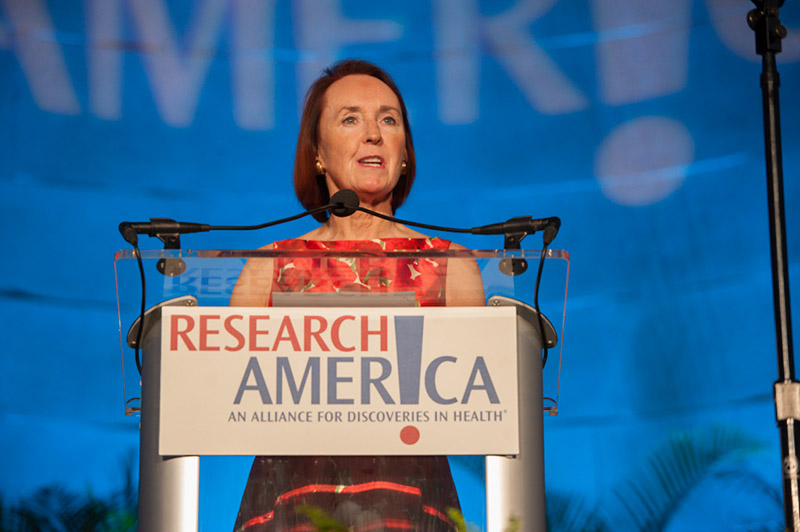Science, Science, Science

Dear Research Advocate,
Congress is expected to pass a stimulus bill that includes significant investments in our nation’s key research agencies. The Coronavirus Aid, Relief and Economic Security (CARES) Act includes $27 billion to BARDA for critical medical supplies, personal protective equipment (PPE), and the manufacturing and purchase of vaccines and therapeutics; $4.3 billion to CDC for public health preparedness and response; $945 million to NIH for vaccine, therapeutic, and diagnostic research; $80 million to FDA for additional funding for vaccines, medical product manufacturing, and medical supply chain monitoring; and $75 million to NSF for research and grant programs related to COVID-19. See a budget chart and summary.
Please consider sending an email to your members of Congress to thank them and urge them to maintain their bipartisan commitment to bolstering U.S. response and recovery efforts. (See our statement). As Ellie Dehoney, our vice president of policy and advocacy said to Bloomberg Law on Tuesday, “Going forward, it will be critical to invest in sustaining and fostering the recovery of our nation’s research institutions so that U.S. scientific capability is strengthened, not dissipated, by COVID-19’s disruptive impact.” Now that we’re all becoming accustomed to hearing what it takes in terms of dollars to tame and weather this storm (this third stimulus bill alone directs the spending of $2 trillion!), future decision-making must evolve accordingly. The staggering cost of insufficient public health preparedness and insufficient commitment to research and innovation is a very high price to pay; we can and should expect to invest in a proactive fashion going forward, in order to avoid ever facing this grim situation again.
As we have all seen, misinformation and rumors — and even hucksterism — is proliferating almost as quickly as the coronavirus. That’s why it is important for stakeholders in science (including scientists!) to speak up and stand up for evidence-based decision-making. I urge you to engage on social media, letters to the editor, and opinion pieces in your local newspapers….whatever forum suits you. Channel your inner Dr. Tony Fauci, whom we recently thanked for his leadership, and whom former Research!America board member the Hon. Dr. Louis Sullivan, HHS Secretary under President George H.W. Bush, cited along with Drs. Redfield and Birx in this compelling statement. You can put our resource-filled webpage to use (www.ResearchAmerica.org/COVID19) to support your communications, as 2009 Nobel Laureate Dr. Elizabeth Blackburn has in her San Francisco Chronicle opinion piece.
Earlier this week, Research!America hosted a member alliance call with Dr. David Skorton, president and CEO of the Association of American Medical Colleges (AAMC), on strategies for academic health centers during the COVID-19 pandemic. Academic medical centers are under considerable pressure right now, ranging from a shortage of PPE to closure of many research labs. In a content-filled, motivating conversation, Dr. Skorton and his colleagues emphasized the irreplaceable value of fundamental research and the critical importance of public-private partnerships. You can find a link to this terrific conversation, including alliance member Q&A, on our COVID-19 resource page.
On Monday, March 30, 2020 at 3 p.m. ET, Research!America alliance members are invited to join our next call with Rear Admiral Erica Schwartz, Deputy Surgeon General, to discuss the COVID-19 response. We will also be joined by Emily Holubowich, vice president, federal advocacy for the American Heart Association, to provide a FY21 appropriations state-of-play. Alliance members can register here. If you missed the recent alliance member call featuring FDA’s Dr. Jacqueline Corrigan-Curay, her presentation about the agency’s progress in real-world evidence is available here.
In other COVID-19 news: APHA executive director Dr. Georges Benjamin, a Research!America board member, points out in this New York Times article the potential damage to coronavirus research that could be caused by a proposed EPA rule many in the science community have been speaking out against. The deadline for public comment is just a few weeks away. Take a minute to visit this link for more information and weigh in. On a positive note, the National Library of Medicine has joined with scholarly publishers and societies to increase access to information on coronavirus-related literature and supporting data. One goal is to expand coronavirus research by bringing this text-mining resource to the attention of the artificial intelligence and machine learning research communities.
Finally, a word of condolence to the family and friends of science journalist Daniel Greenberg, who died on March 9 at age 88. I was one of many in the community who learned to value his skeptical coverage of science. He was never a publicist; always a well-informed questioner — he thought like a scientist, in fact, hunting for the data to back up an assertion; never taking a statement at face value and never intimidated! He sharpened my thinking during interviews and provided first-rate coverage of science policy issues for us all in his books and in Science and Government Report, which was essential reading throughout its publication run. He made a difference in life and will be greatly missed.
Please stay well, stay safe, and stay connected.
Sincerely,
Mary Woolley




